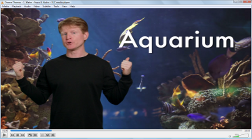Dwane Thomas, the host of the Visual Latin series, is back with WordUp! a vocabulary video based upon Greek and Latin roots. This video course bears no resemblance to other courses teaching Latin and Greek roots! Dwane’s teaching style is a cross between a lecture and stand-up comedy. His presentations are set against continually changing backgrounds that illustrate the lessons. These are great fun to watch!
WordUp! Volume 1, Volume 2, and Volume 3 are available thus far. I reviewed only the first course, but the other two follow the same format.
This course has ten lessons. Each lesson teaches 20 or more English words that are built on corresponding Latin and Greek roots such as terra and geo (earth), multus and poly (many), and grapho and scribo (write). For example, the first lesson teaches aqua and hydra, the Latin and Greek words for water. Thomas then presents words such as aqueduct, aquifer, and hydraulic, each visually illustrated. Aqueduct is taught with an image of a Roman aqueduct in the background. Aqualung is presented with a video of scuba divers running in the background, and hydra begins with a cartoon of the mythical Greek sea monster, the Hydra. In this lesson, Thomas also works through a series of three words that are closely connected: hydrated is presented with a video of workers who need to stay hydrated. A dehydrated worker is next, and then a mummified body illustrates what might happen to you if you became anhydrous (meaning without water).
While all of this is very entertaining, WordUp! adds reinforcement with free online quizzes and practice tools at their “Quizlet” page. All of these are used online rather than printed out except for the test which offers both options. For each lesson, there are online flashcards, a number of practice exercises, two games, and a test.
The practice exercises require students to spell each word correctly. In one exercise they hear the words and type them in. In another, they type the correct word in response to the definition. In one game students have to type in the correct word in response to the definition before they run out of time. In the other game, they simply move words and their definitions on top of each other. Even though the games are not impressive, they still offer a more interesting way for students to check their mastery of the vocabulary than the other practice exercises. The tests are fairly standard with fill-in-the-blanks, multiple-choice, matching, and true/false questions. The tests have customization options that might be very helpful. You can generate many variations of the test with the quick click of a few buttons. You can create a Quizlet account for free so that it will track a student’s activities and tests automatically.
Mild Christian content, such as references to scripture and historical figures familiar to Christians, pops up from time to time throughout the course.
I enjoy watching these lessons, but I have one quibble. While Thomas sometimes explains how an English word is derived from a root word, occasionally he teaches a word with a more complicated derivation, and I wish he would take more time to explain it.
WordUp! is recommended for ages ten and up. Adults will definitely want to watch these lessons too! Students who are unfamiliar with many of the English vocabulary words that are introduced should probably watch each lesson a few times before attempting the Quizlet practice exercises. Free offline study help is also available through sets of downloadable PDF files with double-sided flashcards.
Lesson presentations are available as downloads or on DVDs, but Quizlet must be accessed through the Internet. You can download two free lessons to check it out before buying.










